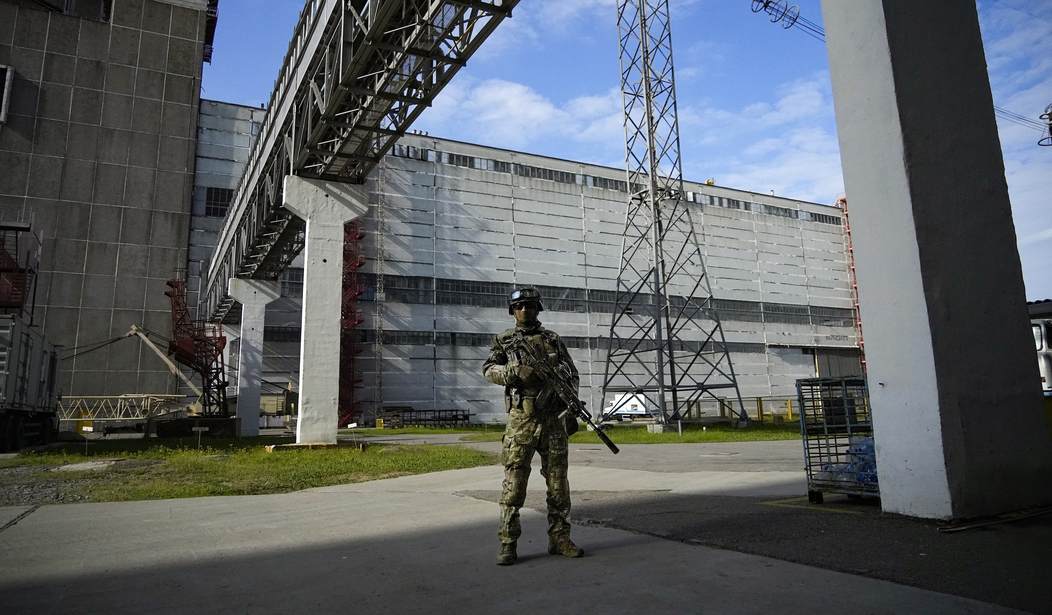Russia captured Ukraine's largest nuclear plant at Zaporizhzhia early in the war and since then, Ukraine has been trying to take it back.
Sometimes, neither side is very careful during battles around the plant. Several bombs and artillery shells have hit various parts of the plant or nearly missed sensitive facilities over the two years of the war, This makes International Atomic Energy Agency (IAEA) Director General Rafael Mariano Grossi very, very nervous.
“Yet again we see an escalation of the nuclear safety and security dangers facing the Zaporizhzhia Nuclear Power Plant. I remain extremely concerned and reiterate my call for maximum restraint from all sides and for strict observance of the five concrete principles established for the protection of the plant," Grossi said in a statement.
Both sides point the finger at the other, accusing each other of playing fast and loose with the safety of a nuclear reactor. It's like both sides are playing "chicken," daring the other side to initiate a catastrophic nuclear disaster that would cause much of the arable farmland in Ukraine to glow.
Just last April, "explosions and rifle fire" were heard near the plant by IAEA inspectors and experts who were present at the plant in an attempt to head off catastrophe. And that's not the only time that the reactors at the plant have nearly melted down. Russia is using the plant as a military staging area, according to plant workers who escaped, which is in direct violation of international law.
Grossi must feel like the boy who cried wolf. The few Ukrainians left at the plant and the tiny number of UN inspectors along with some Russian technicians are all the stands between the plant and an unprecedented nuclear disaster. They have acted heroically in some cases when the plant was minutes from meltdown.
"The Ukrainian citizens that were forced by the Russians to stay in Zaporizhzhia and run this plant for two years should be treated like heroes, and the IAEA could play a role in this," added Robert E Kelley, former chief nuclear inspector at IAEA.
"There's a tendency to want to treat them as collaborators. I think they should get a medal for having served the country in a difficult position, they went through hell."
Zaporizhzhia was built by Russia but was totally redesigned and modernized. That makes it very difficult for Russian technicians to step in and help run it.
“Nuclear power plants are designed to be resilient against technical or human failures and external events including extreme ones, but they are not built to withstand a direct military attack, and neither are they supposed to, just as with any other energy facility in the world,” Grossi said. “This latest attack highlights the vulnerability of such facilities in conflict zones and the need to continue monitoring the fragile situation.”
"Most things here don't react well to bullets," said Sean Connery's Captain Ramius to Jack Ryan played by Alec Baldwin in "The Hunt for Red October." Ramius was referring to the sub missile silos and the nuclear reactor. The same is true for a commercial nuclear reactor.
The IAEA team visited the area and reported that the damage seemed to have been caused by a drone. There were no casualties and no damaged equipment, but the road was damaged between the two main gates to the plant.
Russian state media outlet TASS claimed that staff at the power plant had accused Ukraine of the drone strike.
“At 7 a.m. Moscow time, the Ukrainian drone dropped a shell on the road that runs along the power units outside the perimeter. Personnel use this road all the time. No one was injured, but once again a direct threat to the safety of personnel and the plant was created,” it said.
Ukraine has not yet publicly commented on the strike. However, Russia and Ukraine have blamed previous incidents at the plant on each other.
Most nuclear plant experts say that as long as there's no direct hit on the plant's power generation or deliberate sabotage by either side, the plant should survive and an accident avoided. The plant's six reactors are shut down but still need power to prevent a meltdown.
The longer the war goes on, the more chances there will be for a wayward drone or missile to cause a disaster.










